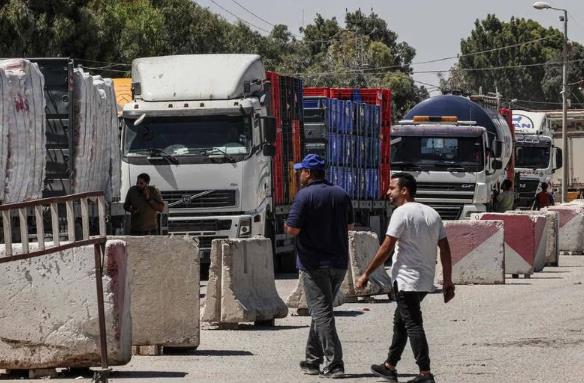Israeli authorities have announced that they have temporarily halted all commercial goods from leaving the Gaza Strip through the Kerem Shalom crossing, the only point of export for the besieged enclave. The decision came after security personnel at the crossing detected several kilograms of high quality explosives hidden in a clothing delivery carried by three trucks.
The explosive material was found inside the lining of the clothes and was allegedly intended for terrorist elements in the occupied West Bank. The goods were seized and the incident was transferred to the investigation of the security forces. The Defense Ministry said that the halting of exports from Gaza was necessary to allow “security adjustments to be made at the crossing” and that deliveries would resume in accordance with subsequent situation assessments.

Palestinian border officials said they were told by Israel that the crossing would be closed “until further notice”. The Kerem Shalom crossing is vital for the economy of Gaza, which has been under a crippling Israeli blockade since Hamas seized power there in 2007. The blockade has exacted a huge economic toll and most Palestinians in Gaza depend on foreign aid.
Israel-Palestine conflict escalates amid spiralling violence
The closure of the crossing point for goods comes amid raging tensions in the occupied West Bank and spiralling violence that has seen at least 225 Palestinians killed so far this year. At least 32 Israelis, a Ukrainian and an Italian have also been killed during the same period.
The latest round of violence was triggered by Israeli raids on Al-Aqsa Mosque compound in Jerusalem, Islam’s third holiest site, during the Muslim holy month of Ramadan. The raids sparked protests and clashes between Palestinians and Israeli forces, as well as rocket attacks by Hamas and other armed groups in Gaza and air strikes by Israel on the coastal strip.
The 11-day war in May ended with an Egyptian-brokered ceasefire, but the underlying issues of the conflict remain unresolved. Israel continues to expand its illegal settlements in the occupied territories, demolish Palestinian homes, restrict Palestinian movement and access to resources, and deny Palestinian rights to self-determination and statehood.
International community urges dialogue and restraint
The international community has expressed concern over the situation in Israel and Palestine and called for dialogue and restraint from both sides. The United Nations, the European Union, the Arab League, and several countries have urged Israel to lift its blockade on Gaza and allow humanitarian aid and reconstruction materials to enter the enclave
They have also called for a resumption of peace talks based on a two-state solution that would end the occupation and create an independent Palestinian state alongside Israel within the 1967 borders. However, such talks have been stalled for years due to Israeli intransigence and Palestinian divisions.
Some countries have also taken steps to support Palestinian rights and condemn Israeli violations. For example, Papua New Guinea announced that it would open an embassy in Jerusalem to recognize it as the capital of Palestine. Libya’s foreign minister was dismissed after meeting with his Israeli counterpart in Rome, causing protests across Libya. Australia’s Labor Party debated whether to recognize Palestine as a state at its national conference.
